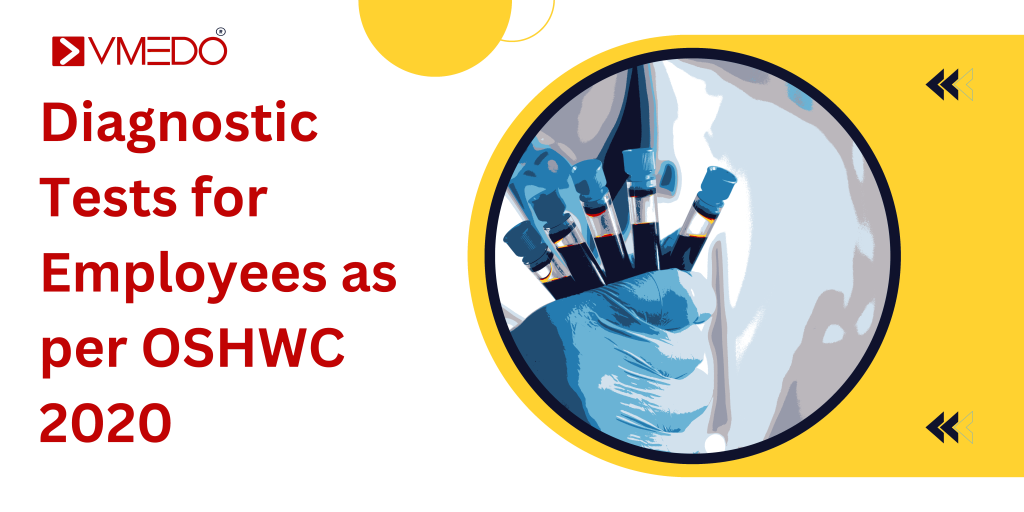Health and safety in the workplace have always been crucial, but with the implementation of the Occupational Safety, Health and Working Conditions (OSHWC) Code, 2020, compliance has become a legal obligation. As businesses evolve, ensuring the well-being of employees is no longer optional. OSHWC 2020 consolidates multiple labor laws and introduces clear guidelines for employee health monitoring. One of the most important aspects of this code is the requirement for periodic health check-ups and Diagnostic Tests for Employees as per OSHWC 2020.
For companies across manufacturing, construction, warehousing, mining, and other labor-intensive sectors, understanding and implementing the mandated Diagnostic Tests for Employees as per OSHWC 2020 is essential. At VMEDO, we assist organizations in navigating these regulations and delivering comprehensive health solutions to maintain compliance and promote employee well-being.
The OSHWC 2020
- Maintain occupational health centers (OHCs)
- Conduct regular health examinations for employees
- Ensure timely diagnostic tests for employees
- Maintain digital health records
- Report occupational diseases and injuries
These measures ensure early detection of occupational illnesses, reduce workplace hazards, and promote a culture of health and safety.
Key Diagnostic Tests for Employees Mandated by OSHWC 2020
The type and frequency of diagnostic tests may vary based on the nature of work, risk category, and exposure levels. However, some standard tests recommended across industries include:
1. Complete Blood Count (CBC)
- Detects infections, anemia, immune disorders.
- Useful for general health screening across all industries.
2. Liver Function Test (LFT)
- Monitors liver damage, particularly in chemical, pharmaceutical, and paint industries.
3. Kidney Function Test (KFT)
- Essential for employees exposed to metals, solvents, or dehydration-prone environments.
4. Chest X-Ray
- Identifies lung infections, silicosis, tuberculosis, and occupational respiratory diseases.
- Crucial for mining, textile, and cement industries.
5. Pulmonary Function Test (PFT)
- Measures lung capacity and breathing patterns.
- Vital for employees exposed to fumes, dust, and gases.
6. Audiometry (Hearing Test)
- Detects early signs of hearing loss due to high-noise exposure.
- Important for factories and construction sites.
7. Electrocardiogram (ECG)
- Checks for heart irregularities, especially in high-stress or physically demanding roles.
8. Vision Test
- Screens for visual acuity and eye strain.
- Necessary for drivers, machine operators, and inspection roles
9. Blood Sugar & Lipid Profile
- Identifies risk for diabetes and cholesterol-related issues.
- Supports long-term health and wellness.
10. Urine Routine Analysis
- Detects infections, diabetes, and kidney issues.
Industries That Must Comply
- Manufacturing and Heavy Industries
- Construction and Real Estate
- Mining and Quarrying
- Warehousing and Logistics
- Chemical and Pharmaceutical Units
- Oil and Gas Sector
Employees working in high-risk environments need regular health assessments as a preventive and legal measure.
Frequency of Diagnostic Testing
As per OSHWC 2020, diagnostic tests must be conducted:
- At the time of employment (Pre-employment Check-up)
- Annually for all employees (Annual Health Check-ups as per OSHWC 2020)
- More frequently in high-risk or exposed environments
Employers must maintain proper health records of all diagnostic results and submit reports to relevant authorities as required.
VMEDO’s Role in Diagnostic Tests for Employees as per OSHWC 2020 Compliance
At VMEDO, we understand the challenges businesses face in managing large-scale health check-ups. Our services are designed to ensure seamless compliance with OSHWC 2020:
1. On-Site Diagnostic Camps
- We set up health camps at your factory or site to minimize disruption.
2. Custom Test Packages
- Based on your industry and risk exposure, we tailor diagnostic bundles.
3. NABL/NABH Lab Tie-ups
- Assure quality and accuracy through certified medical partners.
4. Digital Health Records
- Maintain employee health data securely and accessibly
5. Timely Reporting
- Detailed reports delivered promptly for internal and statutory use
6. Doctor Consultations
- Post-test counseling for employees to understand their health better.
Why Compliance Benefits Your Business?
Meeting OSHWC 2020 diagnostic requirements is not just about avoiding penalties—it’s a strategic investment in your workforce:
- Reduce Absenteeism through early detection and prevention
- Boost Productivity by keeping your team healthy
- Avoid Legal Action by staying compliant with statutory norms
- Improve Employee Trust through transparent health practices
- Enhance Brand Image as a responsible and safety-conscious employer
FAQs: Diagnostic Tests for Employees as per OSHWC 2020
1. Is diagnostic testing mandatory for all types of employees?
It is mandatory for employees in notified sectors and for those exposed to health risks, as per OSHWC 2020
2. What happens if a company fails to comply with diagnostic requirements?
Non-compliance may lead to fines, penalties, or legal action from labor authorities
3. How frequently should these tests be conducted?
At the time of hiring and annually thereafter. Some high-risk roles may need more frequent testing.
4. Can VMEDO handle multi-location diagnostic testing?
Yes. We have a wide network and can arrange tests across different sites with centralized reporting.
5. Are digital records necessary?
Yes. Digital maintenance of employee health data is encouraged for transparency and ease of compliance.
6. How much time does a typical diagnostic camp take?
Depending on the number of employees, it can be completed within 1-2 days per site.
The OSHWC Code, 2020 marks a new era in occupational health and safety. Diagnostic testing for employees is no longer an optional measure—it’s an essential part of workforce management. With VMEDO’s tailored diagnostic solutions, your organization can meet compliance standards while promoting a culture of care and prevention.
